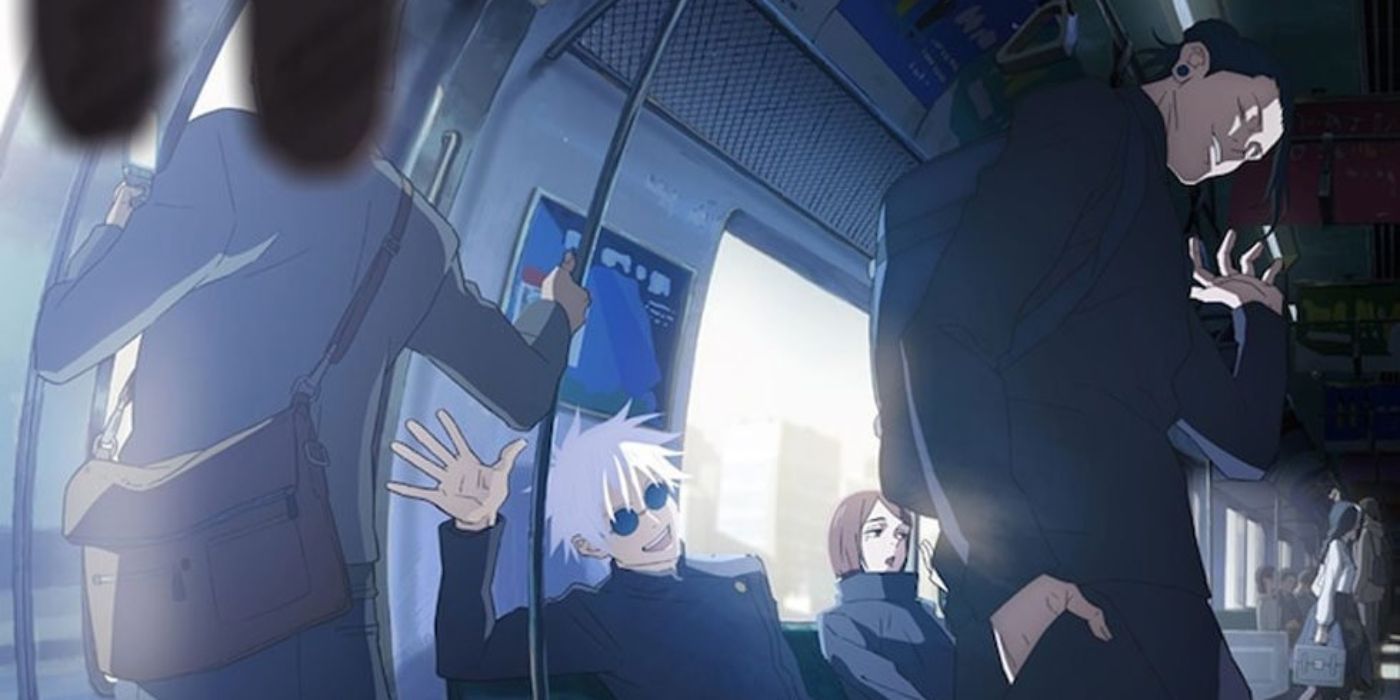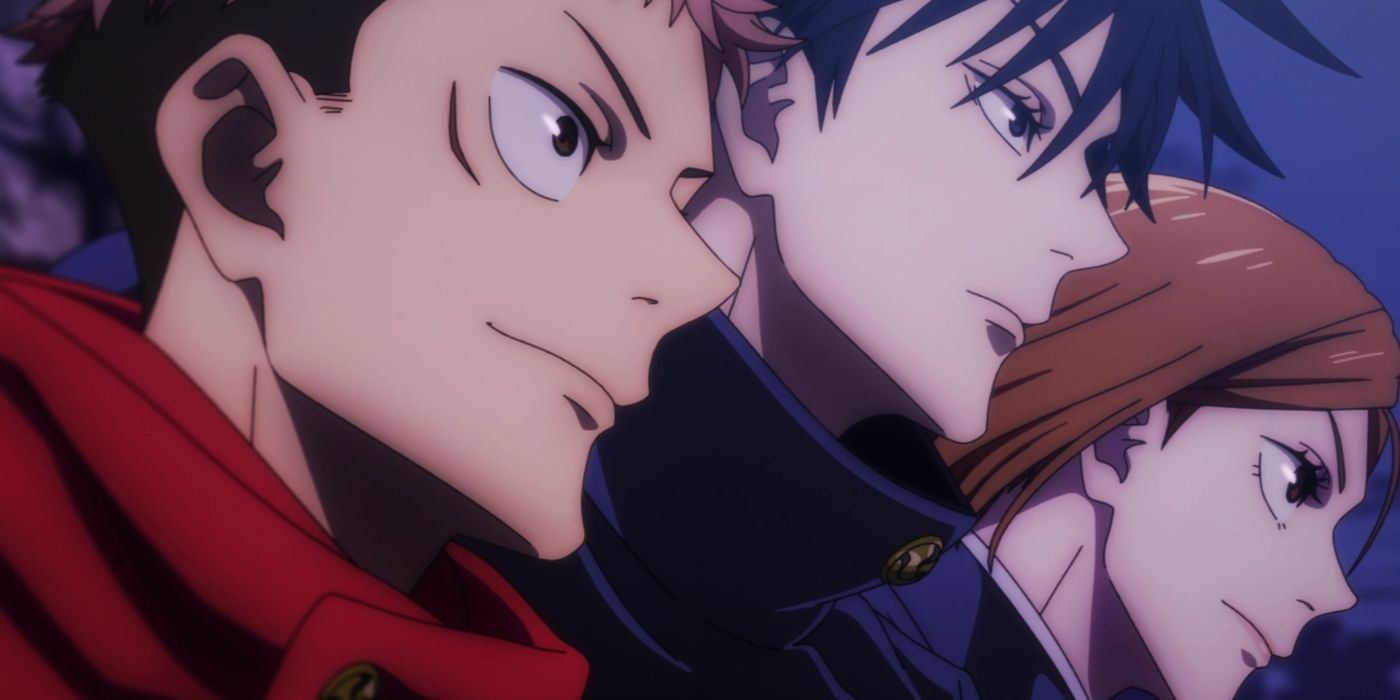With the start of Jujutsu Kaisen’s Shibuya Incident arc, the anime returns to its present-day of 2018 after a series of flashbacks. The Jujutsu Kaisen 0 movie, released between the show's two seasons, follows the events of the year before Yuji arrives at Tokyo Jujutsu High. The Gojo’s Past arc, which encompasses the first five episodes of Season 2, brings the show back to 2006 and Gojo’s high school years. This focus on the characters' histories, with two consecutive flashbacks, raises the question of why Jujutsu Kaisen is so concerned with the past—and what this might say about its future.
Mangaka Gege Akutami has previously suggested that the Jujutsu Kaisen manga will end around late 2023, and fans have been theorizing about the story’s ending. Though there are many potential conclusions from this point, looking at the series' themes and messaging can help narrow down the possibilities. Jujutsu Kaisen contains a strong theme of the conflict between change and stagnation, and highlights how cycles of harm carry through generations. Ultimately, the manga and anime ask whether the characters can change the status quo that has harmed, corrupted, and killed so many of their fellow sorcerers.
How Jujutsu Kaisen's Past Impacts Its Present

The first arc of Season 2—called Gojo’s Past, or Hidden Inventory/Premature Death—follows Geto's corruption. It is the norm in jujutsu sorcerer society to put high school students in dangerous and traumatic situations, and this is no different for Geto. Through his work, he is exposed to traumatic events such as Riko's murder, Haibara's death, and the cruel imprisonment of Nanako and Mimiko. Combined with the misery of constantly consuming exorcised curses, these experiences twist his commitment to defending the weak into the desire to kill all non-sorcerers and put an end to the creation of cursed spirits. The status quo of jujutsu society pushes impressionable teenagers into traumatic situations, and Geto eventually becomes desperate to end this suffering.
The plot of the Jujutsu Kaisen 0 movie concerns more recent events, taking place only a year before the anime's first season. Though the movie premiered prior to the start of Season 2, it explores the end of Geto's arc, about a decade after Riko's death began his descent into villainy. At the end of the movie, it appears that Gojo triumphs over Geto by killing him—but his failure to dispose of the body later allows a curse user to possess it. This context is important, as the anime's present events all lead back to the mastermind fans call Pseudo-Geto, and Gojo's sentimentality may have made Geto's body available for possession. After killing Geto, he allows his former best friend's new allies to claim the body instead of turning it over to Shoko, and created the opportunity for a new villain to rise.
All of this backstory is crucial to understanding the current character motivations and plot of Jujutsu Kaisen, including the way Geto's former peers reject the culture that caused Geto's downfall. Though the higher-ups continue to treat children as unpaid labor, Nanami and Gojo have learned to let kids be kids. In a Season 1 episode, Nanami insists that it is his responsibility as an adult to care for Yuji's safety. During the Goodwill Event, Gojo plans a baseball match to give the students a break from constant peril. These small signs suggest the possibility for change in the world of jujutsu sorcerers—if only through small gestures to make life more bearable for the teenagers forced to shoulder huge responsibilities.
How Jujutsu Kaisen's Themes Predict Its Ending

Analyzing Jujutsu Kaisen's theme of the conflict between change and stagnation provides a clearer view of its potential endings. The show criticizes the status quo through its major characters, particularly Gojo's conflicts with the higher-ups, such as delaying the execution orders for both Yuta and Yuji. The three sorcerer families—Zenin, Kamo, and Gojo—are critiqued for their unfair expectations of women and cruelty toward non-sorcerers within the family. Despite Toji's attempts to break away from the Zenins and start a family of his own, the cruelty he learned from his elders leads him down a path of violence that culminates in killing Riko.
The anime also explores generational cycles by showing how Yuji and Megumi parallel Geto and Gojo. Both pairs have differing morals on what it means to be a jujutsu sorcerer. Yuji is concerned with saving as many people as possible; Megumi is more selective in who he wants to protect, interested in saving only those who won't harm others in the future. Yuji's position is similar to Geto's, in that Geto has a strong moral compass with his desire to protect the weak. Gojo and Megumi are more cynical, and further, both inherited a prized technique from their powerful families: Megumi's Ten Shadows Technique from the Zenin clan, and Gojo's Six Eyes.
Looking at these elements of the story leads to the ultimate question of the series: will the characters remain trapped in a system that harms them, or find a way to build a better future? The first option for the ending is that the status quo maintains, despite the way it affects jujutsu sorcerers. This could lead to Yuji and Megumi carrying out the same tragic cycle as Geto and Gojo. Given Yuji's death sentence, it's possible that Megumi could be the one to carry out his execution, just like Gojo was forced to kill Geto. Of course, the ending might not be so bleak. There's another option—the possibility for change within jujutsu sorcerer society allows the characters to break from its harmful traditions and cycles. This may not mean a happy ending for the characters, but it would allow the anime to end on a hopeful note, with the cycle of harm broken for future generations.
Jujutsu Kaisen's emphasis on the past and its themes of challenging the status quo can serve as valuable clues to where the plot is heading. The story is intentional about tracing its backstory and prompts viewers to consider how the characters' histories influence the plot. In a show that concerns itself so much with how the past shapes the future, and how the status quo upheld by those in power harms people, the potential endings come down to whether change is possible. Ultimately, the show is angling toward showing whether the characters can break free from cycles of cruelty and an unjust system.
As the manga approaches its ending and the anime's stakes continue to increase with the start of the Shibuya Incident arc, fans are excited to see where the story will go next. Jujutsu Kaisen has never shied away from shocking twists—including killing off major characters—so it's fair to assume that the ending will also provide its own surprises. Wherever the plot goes from here, it will certainly provide compelling answers to the questions raised throughout the story and tie its themes together in a satisfying conclusion.

